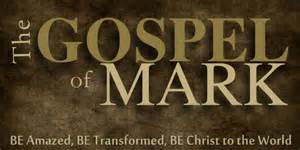
"Jesus marveled because of their unbelief"
Scripture: Mark 6:1-6
1 He went away from there and came to his own country; and his disciples followed him. 2 And on the Sabbath he began to teach in the synagogue; and many who heard him were astonished, saying, "Where did this man get all this? What is the wisdom given to him? What mighty works are wrought by his hands! 3 Is not this the carpenter, the son of Mary and brother of James and Joses and Judas and Simon, and are not his sisters here with us?" And they took offense at him. 4 And Jesus said to them, "A prophet is not without honor, except in his own country, and among his own kin, and in his own house." 5 And he could do no mighty work there, except that he laid his hands upon a few sick people and healed them. 6 And he marveled because of their unbelief. And he went about among the villages teaching.
Meditation: Are you critical towards others, especially those close to you? The most severe critics are often people very familiar to us, a member of our family, a relative, or neighbor we rub shoulders with on a regular basis. Jesus faced a severe testing when he returned to his home town, not simply as the carpenter's son, but now as a rabbi with disciples. ?It would have been customary for Jesus to go to the synagogue each week during the Sabbath, and when his turn came, to read from the scriptures during the Sabbath service. His hometown folks listened with rapt attention on this occasion because they had heard about the miracles he had performed in other towns. What sign would he do in his hometown? Jesus startled them with a seeming rebuke that no prophet or servant of God can receive honor among his own people. The people of Nazareth took offense at him and refused to listen to what he had to say. They despised his preaching because he was a workingman, a carpenter, a mere layman and they despised him because of his family. How familiarity can breed mistaken contempt. Jesus could do no mighty works in their midst because they were closed and disbelieving towards him. If people have come together to hate and to refuse to understand, then they will see no other point of view than their own and they will refuse to love and accept others. Do you easily take offense at others?
The word "gospel" literally means "good news". Isaiah had prophesied that the Messiah would come in the power of the Holy Spirit to bring freedom to those oppressed by sin and evil (see Isaiah 61:1-2). Jesus came to set people free from the worst tyranny possible -- the tyranny of slavery to sin and the fear of death, and the destruction of both body and soul. God's power alone can save us from emptiness and poverty of spirit, from confusion and error, and from the fear of death and hopelessness. The gospel of salvation is "good news" for us today. Do you know the joy and freedom of the gospel?
"Lord Jesus, you are the fulfillment of all our hopes and desires. Your Spirit brings us grace, truth, life, and freedom. Fill me with the joy of the gospel and inflame my heart with love and zeal for you and for your will."


.jpg)
.jpg)
.jpg)
.jpg)
.jpg)

.jpg)
.jpg)
.jpg)

.jpg)

.jpg)
.jpg)